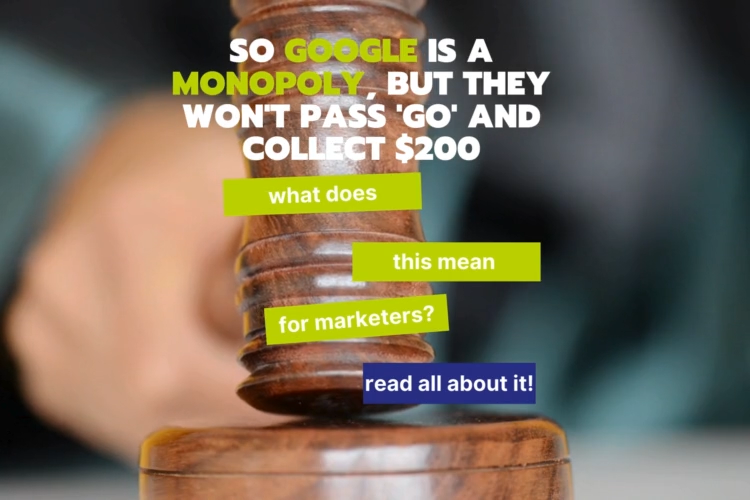Landmark Decision Could Have Far Reaching Implications, Eventually

The TL;DR
Google is a monopoly, and in other news water is wet (not really, but that’s a topic for a different day). In the short term, Google being determined to have an illegal monopoly will have almost no impact on your marketing strategy and tactics as long as you’re employing a diversified, TraDigital™ approach and you’re actively managing your tactics to ensure conversion optimization and attribution to the most cost-effective channels.
The Facts
Yesterday Judge Amit Mehta of the US District Court for DC Circuit handed down a 286 page ruling that Google, through its exclusive distribution agreements for its search engine, is in fact a monopoly. The court wrote “Google has violated Section 2 of the Sherman Act by maintaining its monopoly in two product markets in the United States–general search services and general text advertising–through its exclusive distribution agreements.” Back in 2020, the US Department of Justice and several states’ Attorneys General filed suit against Google alleging they abused their position to create exclusive agreements with companies like Apple and Samsung that stifled competition and raised prices for consumers and business. Judge Amit Mehta found the facts were sufficient to deem Google had violated antitrust laws (which have been on the books since 1890) and was indeed a monopoly. A pretty staggering finding (though not surprising) that could reshape the organic search, browser and paid search landscape in years to come.
So, What Does This Mean?
Over the last four years, Google has been the focus of several lawsuits and under pressure from an increasing focus on privacy, adjusting to changing web usage behavior, and navigating the dynamically changing AI landscape and its impact on their search business. At the core, Google operates in three realms that it has gained monopoly power that lets it reap over $170 billion in advertising revenue: organic search (the Google search result, in which it maintains a 90% market share), Google Chrome browser (65% market share) and the Google Ads marketplace. While this ruling is specifically about anti-competitive practices related to its search tool, the implications are far reaching because the entire ecosystem is interdependent. Without Google getting preferential (default) position as the search engine, they wouldn’t be able to leverage that power in terms of search preference data and market pricing on their Ads platform.
Google may be forced to change its distribution agreements with browser developers, carriers and device manufacturers. This could open the market for developers like Bing, DuckDuckGo, SearchGPT and others to negotiate for default search engine placement, which would diminish Google’s power and level the playing field for search. Google could also be forced to share user data with competitive search engines which would improve the quality of their search results, thereby diminishing Google’s perceived value as the “best” search engine. This would be similar to the Microsoft browser antitrust ruling of 2001, which deemed Microsoft’s Internet Explorer a monopoly, and led to the proliferation of independent browser platforms such as Firefox, Safari and Chrome!
A more dramatic outcome could be the Department of Justice forcing Google to breakup its search business from its advertising and browser businesses. This would be similar to the 1984 Consent Decree in which the DOJ and AT&T agreed that AT&T had monopoly power over long distance and local telephony, resulting in the AT&T break up and the rise of the regional bell telephone companies and independent long distance companies such as WorldCom, MCI, Frontier and others. If the DOJ sought to break up Google’s business into two or more pieces, the implications for competition, pricing, and innovation would be enormous and would dramatically change the search, browser and ad tech ecosystem.
Timeline For Impact
With the ink barely dry on Judge Mehta’s ruling, Google has already announced they will appeal. While they will likely lose the appeal because the finding of fact was pretty substantial and thorough, they could get a reversal which would mean nothing changes. Regardless of their success on appeal, it is highly unlikely that in the next 18 to 24 months we will see any tangible impact from the decision. Once the appeal clock has run out, it will still be several years before any significant changes manifest, whether they are more dramatic like a forced break-up or they are less onerous, like revised distribution contracts or forced data sharing among browser and search competitors.
The court’s ruling against Google sets the stage for significant changes in the digital search and advertising markets. Potential remedies could aim to dismantle Google’s monopolistic hold and foster a more competitive environment. While the immediate impacts will revolve around compliance and adjustment, the medium to long-term effects may lead to increased innovation and competition, benefiting consumers and advertisers alike. The timeline for any of these impacts will vary, but the overall goal will be to ensure a fairer, more open market.
What Should Marketers Do?
At this time there really isn’t anything different marketers should be doing. In the short term, this doesn’t change anything that we aren’t already doing on behalf of our clients. A diversified, TraDigital™ approach to advertising that optimizes conversions and employs the best practices for media-mix marketing will ensure you’re not putting all your eggs in one basket. Good, robust, accurate reporting and active campaign management will ensure that you are staying ahead of any headwinds or challenges with your strategy and are able to pivot quickly to respond to consumer behavior. And having your marketing partner monitoring the broader changes in the ecosystem-from organic search, social, NIL and reputation management to paid digital, sponsorships and traditional media will ensure you’re maximizing revenue opportunities and mitigating threats to your business.

